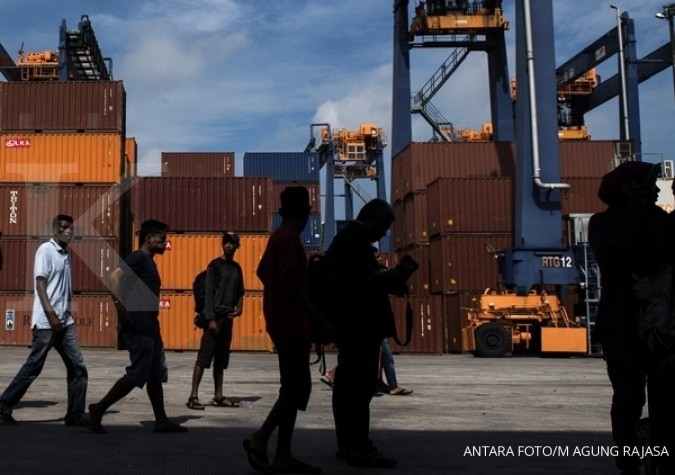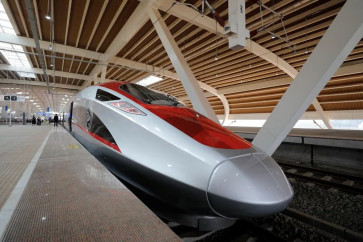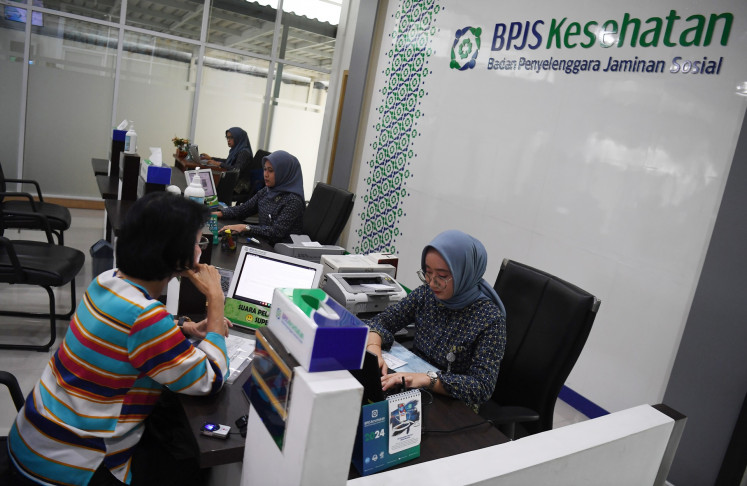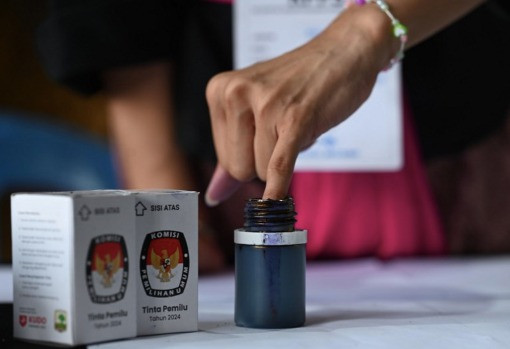Rail key to reducing logistics costs: DB Schenker
Change Size
 Porters walk past containers in Tanjung Priok Port, in North Jakarta. President Joko Widodo is looking to cut logistics costs by building 11 bonded logistics centers this year, and 50 more next year. (Antara/M. Agung Rajasa)
Porters walk past containers in Tanjung Priok Port, in North Jakarta. President Joko Widodo is looking to cut logistics costs by building 11 bonded logistics centers this year, and 50 more next year. (Antara/M. Agung Rajasa)
R
ail-based transportation is one of the ways for logistics companies to boost performance in Southeast Asia's largest economy as it saves money and time, a senior official of a major logistics company has said.
Indonesia's unique terrain is one of the challenges to efficient transportation of customers’ goods, Asok Kumar, president director of German-based transportation and logistics company DB Schenker said.
The company believes that rail is one of the more innovative ways of transporting freight in the archipelago, specifically within the larger islands, he said.
DB Schenker has been working in partnership with state-run PT. Kereta Api Logistik (Kalog) since May of last year.
Freight trains have not been a commonplace mode of transportation in Indonesia in the past, Kumar said, pointing to customers' reluctance to avail of the service. However, it was a solution DB Schenker continued to pursue aggressively.
"It reduces the transit time, it reduces the cost and it also maintains the integrity of the goods a lot better than trucks," he said.
Although DB Schenker is currently focusing on the Jakarta-Surabaya, East Java, line it is also looking forward to railway developments in Sumatra, Kalimantan and Sulawesi, and even seeking to expand the network within Java itself.
"Once that is all up and running, we'll be very active in promoting it with companies starting to use trains rather than trucks," Kumar added.
He commended the reliability of state-run PT Kalog, which, he said, operated punctual trains without any issues regarding transit time.
The Jakarta-Surabaya journey by train takes approximately 18-20 hours, in stark contrast to the 72 hours taken by trucks that even then depend on other factors such as traffic, which can increase delays.
Not only does the rail solution save time and maintain the integrity of the goods, it also reduces costs. Savings amount to 15-20 percent per unit, Kumar said. This would also impact on commodity prices overall, he added.
"We really think, in Indonesia with the congestion on the roads, rail is going to be fantastic," said Kumar.
While he admitted that the company faced challenges amid the economic slowdown, Kumar said it was still active despite the slow growth. The company also considers Indonesia to be a fast-moving and emerging market and as such there is continued interest in increasing investment in the country.
Kumar said he was positive on Indonesian economic growth, especially commending the government's policies, which he regards as headed in a positive direction, while giving credit to President Joko "Jokowi" Widodo's vision. The company aims to achieve 15 percent growth by the end of 2016.
The government’s investment in Infrastructure will greatly contribute to growth as soon as it starts picking up pace, he continued.
Indonesia's logistics costs are currently double those of Singapore and Malaysia.
Finance Minister Bambang Brodjonegoro said in March that the government aimed to open 50 more bonded logistic centers (PLBs) in Indonesia next year as part of an effort to transform the country into an emerging logistics hub in the Asia-Pacific region.
The centers are a follow-up to the 11 logistics centers to be inaugurated in 2016.
The PLBs are being developed as part of the implementation of a second economic policy package and are expected to serve as distribution centers or warehouses for imported basic materials to significantly reduce logistics costs, Bambang said. (rin)









